While having lunch with John in Bermuda, I brazenly asked him for a job in the recording studio. “We'll see,” he replied. “I'll ask mother.” The answer to my request came a few weeks later when he returned to New York in August.
© AP Images
© AP Images
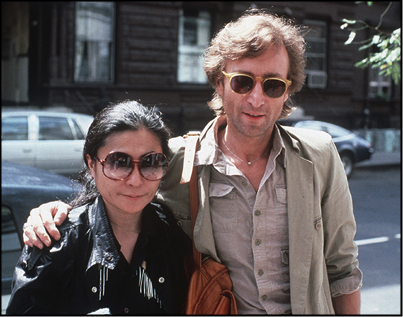
© AP Images
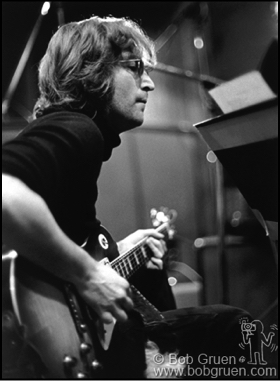
© Bob Gruen
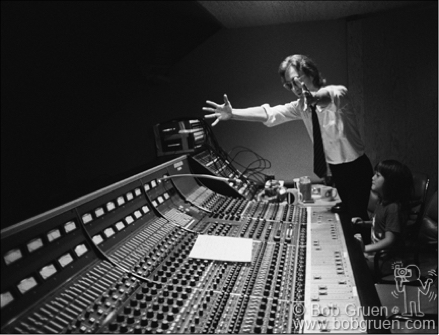
© Bob Gruen
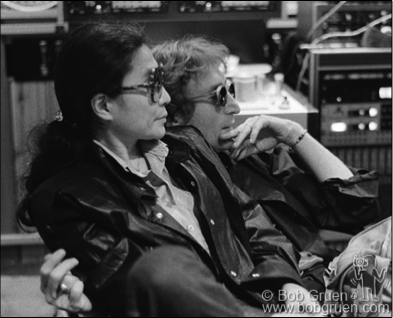
© Bob Gruen
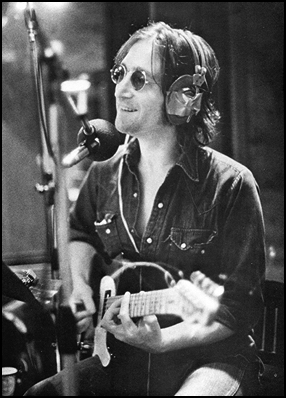
© AP Images
NOTE: All the quotes from the Double Fantasy recording sessions are transcribed from the reference tapes, which run into hundreds of hours. Jack Douglas bugged the studio in response to an off-hand remark by John. According to Douglas, he said, “I wish someone would wire the control room, because all the best things are said in here.” Jack gave the tapes to John as a birthday present.
Enter Text
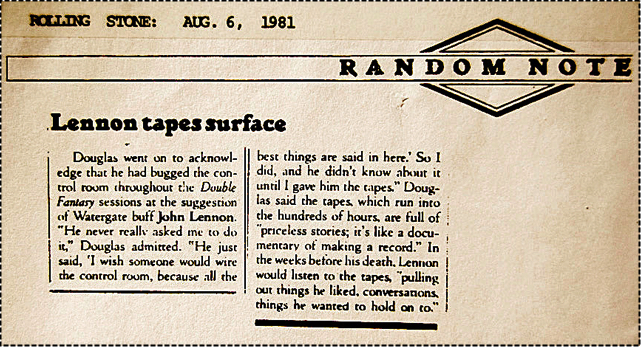
me. When he invited me to visit him in the studio, I always came away feeling sorry for myself. Later, when the sessions were over, I had the opportunity to listen to several hours of the reference tapes, which recorded all the musical takes as well as the chatter among the musicians.
“I get so excited we're recording,” John told those in the control room. “You know I used to be pretty big in this business before I took my shoes off.”
It was his first recording session in five years, and he behaved like a giddy teenager in love. After a day or two of working with the band, crafting the sound he wanted, the sessions began. Whenever there were delays, he would recall old times or play Beatles
Meanwhile, the musicians haggled about the chord changes. The delay lasted several minutes—John became agitated. “Okay! Okay! Let's do it before the drugs wear off!” he quipped.
Finally, sensing John's irritation, Douglas announced, “We're rolling!” But before he gave the band a countdown John declared, “This one's for Gene, Eddy, and Elvis . . . and Buddy!”
songs, entertaining the musicians. During one long delay, Tony Levin, the bass guitarist, began improvising on the sheet music.
“That's lovely!” John said. “I love it. They didn't have that in those days. That's the only thing they didn't have—a good bass!”
“John, we're all set,” interrupted Jack Douglas. “Are you ready for a take?”
“Uh, I guess so, Jack. Well, I'm never that ready.”
During another session, just as the twenty-four-track tape machines began to roll, lead guitarist Hugh McCracken interrupted John to ask about a chord change, everything came to a halt.
“It's the same one in every song!” John snapped. “I only know ten. Why doesn't somebody blindfold that guy, instead of looking at these fuckin' sheets?”
He told me Yoko had already decided on the staff; I would keep track of the tapes, and mostly be relegated to the Dakota. After his comment years earlier, about my horoscope and musical talents, I'd hoped he would fight for
The master vocal tracks took several weeks to record. Most completed with two or three takes. John recorded the songs first, and then have the band back him while he played rhythm guitar.
One day, while recording guitar overdubs, Yoko announced from the control room talkback mike, “Sean is here.” John's son walked up to the window that isolated the room from the studio and pressed his face against the glass.
“I can see the picture,” Sean shouted to his father.
When John had finished a guitar overdub, he joined Sean and nanny Helen in the control room. While he waited for the engineer to check the recording, John chatted with Helen.
“We never have to shut up for dad. He's always spouting off,” he said.
“Another beer, please!” Sean interrupted his father. So Helen took him out of the studio, while John retuned his guitar before the next take.
“Are you leaving?” he called. “Au revoir my dears; I'll see you later, or tonight, or tomorrow, or whenever.”
Photos of John and Yoko in the studio courtesy of Bob Gruen.
All photos are used in a nonprofit, educational context with the claim of fair use.
This web site is copyright © 2020 by Michael Barbosa Medeiros.
All rights reserved.
A few days later, he worked late into the night recording guitars overdubs on “Starting Over.” He sat beneath a halo of light, alone in the darkened studio. Music stands, microphone booms, and sound partitions cluttered the empty room. Chairs poking from the shadows, looked like tombstones. Before the take, he quipped, “Live from the cemetery. Live from Forest Lawn.”
Later, when he listened to the playback over the control room speakers, John was uncertain. “He kinda' rushes it, I don't blame him. He's so excited; he can't wait to start. Who is that fucker?”
“Hello! I can see you,” John said. “I'll come in and say hello in minute. Isn't it a funny place, like a space ship, isn't it? Did you see your picture?” A large color photograph of Sean had been taped over the television screen above the window.
The engineer interupted John's banter to announce the tape machines were now ready with the reels for the “Woman” tracks.
“Put me on in the intro,”he told the engineer, “I wanna' say something . . . whisper something.” As the recording begins, John exhailed into the microphone, “This is for the other half of the sky.” After he listened to the playback of his double-tracked vocal, he pronounced, “I was just trying to think who this would be good for. Somebody should have a hit with this. Not me. We've made a good demo.”
SESIONES DE ESTUDIO
Mientras almorzaba con John en las Bermudas, descaradamente le pedí un trabajo en el estudio de grabación. "Ya veremos", respondió. "Le preguntaré a Madre". La respuesta a mi solicitud llegó unas semanas después, cuando regresé a New York en agosto.
Me dijo que Yoko ya se había decidido por el personal; yo seguiría la pista de las cintas y, en la mayor parte del tiempo, quedaría relegado al Dakota. Después de su comentario de años antes, sobre mi horóscopo y talentos musicales, esperaba que luchara por mí. Cuando me invitaba a visitarlo en el estudio, siempre salía sintiendo lástima por mí mismo. Posteriormente, cuando terminaron las sesiones, tuve la oportunidad de escuchar varias horas de las cintas de referencia, que registraban todas las tomas musicales, así como la charla entre los músicos.
"Me emociono tanto que estemos grabando", le decía John a los que estaban en la sala de control. "Sabes que solía ser bastante importante en este negocio antes de quitarme los zapatos".
Era su primera sesión de grabación en cinco años y se comportaba como un adolescente vertiginoso y enamorado. Después de un día o dos de trabajar con la banda, creando el sonido que quería, comenzaron las sesiones. Siempre que había retrasos, recordaba los viejos tiempos o tocaba temas de los Beatles, entreteniendo a los músicos. Durante un largo retraso, Tony Levin, el bajista, comenzó a improvisar en la partitura.
"!Eso es adorable!" , dijo John. "Me encanta. No tenían eso en esos días. Eso es lo único que no tenían: ¡Un buen bajo!"
"John, estamos listos", interrumpió Jack Douglas. "¿Estás listo para una toma?"
"Uh, supongo que sí, Jack. Bueno, nunca estoy tan listo".
Durante otra sesión, justo cuando las grabadoras de veinticuatro pistas se echaron a andar, el guitarrista principal Hugh McCracken interrumpió a John para preguntarle sobre un cambio de acorde, todo se detuvo.
"!Es el mismo en todas las canciones!" John contestó impaciente. “Solo sé diez. ¿Por qué nadie le vendará los ojos a ese tipo, en lugar de mirar estas malditas hojas?"
Mientras tanto, los músicos trataban de ponerse de acuerdo sobre los cambios de acordes. La demora duró varios minutos; John se puso nervioso. "!Ok! !Ok! ¡Hagámoslo antes de que desaparezcan los efectos de las drogas!" bromeó.
Finalmente, sintiendo la irritación de John, Douglas anunció: "¡Estamos rodando!" Pero antes de darle a la banda una cuenta regresiva, John declaró: “Este es para Gene, Eddy y Elvis. . . y Buddy!"
Las pistas vocales maestras tardaron varias semanas en grabarse. La mayoría se completó con dos o tres tomas. John grabó las canciones primero y luego hizo que la banda lo respaldara mientras tocaba la guitarra rítmica.
"!Hola! Puedo verte", dijo John. “Entraré y te saludaré en un minuto. ¿No es un lugar divertido como una nave espacial? ¿Viste tu foto?. Una gran fotografía a color de Sean había sido pegada sobre la pantalla del televisor encima de la ventana.
"Puedo ver la foto", le gritó Sean a su padre.
Cuando John terminó de grabar los agregados de guitarra, se reunió con Sean y la niñera Helen en la sala de control. Mientras esperaba que el ingeniero revisara la grabación, John conversó con Helen.
"Nunca tenemos que callarnos por papá. Siempre está gritando", dijo.
"!Otra cerveza por favor!" . Sean interrumpió a su padre. Así que Helen lo sacó del estudio, mientras John afinaba su guitarra antes de la siguiente toma.
"¿Te vas?" , él lo llamó. "Au revoir mis queridos; Te veré más tarde, o esta noche, o mañana, o cuando sea".
Unos días más tarde, trabajó hasta altas horas de la noche grabando agregados de guitarras en "Starting Over". Estaba sentado bajo un halo de luz, solo en el estudio a oscuras. Atriles, micrófonos y particiones de sonido abarrotaban la habitación vacía. Había sillas asomando desde las sombras, parecían lápidas. Antes de la toma, bromeó: "En vivo desde el cementerio. En vivo de Forest Lawn". (Forest Lawn es un gran cementerio establecido en 1850 en la ciudad de Nueva York.)
Más tarde, cuando escuchó la reproducción por los altavoces de la sala de control, John no estaba seguro. “Él se apresura un poco, no lo culpo. Está tan emocionado; no puede esperar para empezar. ¿Quién es ese hijo de puta?"
El ingeniero interrumpió las bromas de John para anunciar que las máquinas de cinta ya estaban listas con los carretes para las pistas de "Woman".
"Ponme en la intro", le dijo al ingeniero, "Quiero decir algo. . . susurrar algo". Cuando comienza la grabación, John exhaló por el micrófono: "Esto es para la otra mitad del cielo". Después de escuchar la reproducción de su voz doblada, pronunció: “Solo estaba tratando de pensar para quién sería bueno. Alguien debería tener un éxito con esto. Yo no. Hicimos un buen demo".
NOTA: Todas las cintas de las sesiones de grabación de Double Fantasy son transcritas de las cintas de referencia, que suman cientos de horas. Jack Douglas puso micrófonos en el estudio en respuesta a un comentario improvisado de John. Según Douglas, John dijo: "Me gustaría que alguien cableara la sala de control, porque aquí se dicen las mejores cosas". Jack le dio las cintas a John como regalo de cumpleaños.
❑
Traducido por Carlos Larriega © 2021
Enter Text
Leer in Español, desplácese abajo
Leer in Español, desplácese abajo
Leer in Español, desplácese abajo
Leer in Español, desplácese abajo
Leer in Español, desplácese abajo
Leer in Español, desplácese abajo
Leer in Español, desplácese abajo
Enter Text
Leer in Español, desplácese abajo
Leer in Español, desplácese abajo
LEER
Leer
In John Lennon's Garden
A portrait of his last years